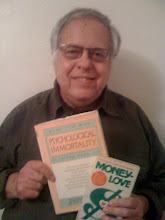Rosenblatt's new book follows his writing class for a semester and is called, Unless It Moves The Human Heart: The Craft and Art of Writing. During the interview, the author, who often has done video essays for the NewsHour, says he has found four reasons to write:
"To make suffering endurable, evil intelligible, justice desirable, and love possible."
Rosenblatt then said, "The most important is love. That after all the suffering, all the evil, all the injustice one sees in the world, if you can rise above it and make it beautiful and thus loveable, then that's worth a life."
But what fascinated me most about this seven minute segment was a fact it brought out. That despite the terrible state of the publishing industry, where getting fiction published is increasingly difficult, and nonfiction not much better, and book sales are way down--the number of people enrolled in writing classes has surged to new highs. More and more people want to be writers, and Rosenblatt notes that most want it for the sheer art of doing it rather than any expectation of being published or earning a living at it. An offshoot of this phenomenon is of course the amazing number of bloggers out there. Estimates are that there are over 100 million blogs worldwide, and 30% of these are in the U.S. Which would mean almost 10% of the men, women, and children in the U.S. write blogs. Mind boggling to say the least. And all of this is driven by the desire to express oneself through writing.
Roger Rosenblatt says the ultimate criteria for success as a writer is whether what you do is useful in the world, useful to other people. This certainly could be the standard for all of us in whatever we do. A good question to ask ourselves therefore is, "What do I do that is useful to other people?"
Jerry
Check out my other blog on prosperity at:
